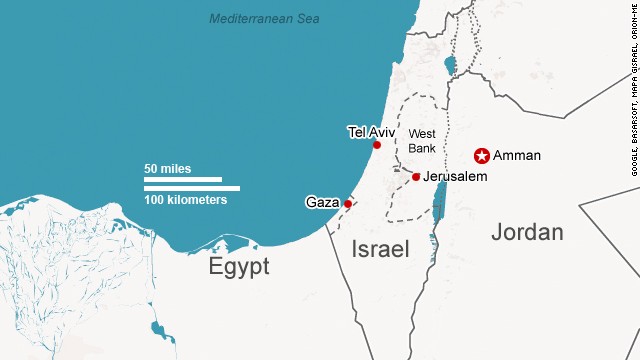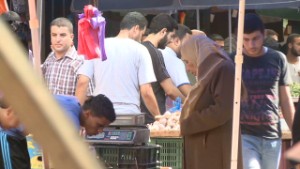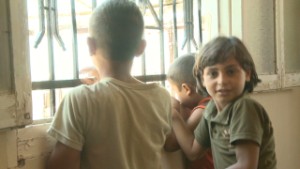Abbas heads to Egypt for Gaza talks after failed cease-fire
updated 10:20 AM EDT, Wed July 16, 2014
Source: CNN
Egypt, seeking to flex
its regional muscle, had brokered the earlier deal as well, but Hamas
leaders complained they had not been consulted and the scope of the
cease-fire was too narrow.
Israel accepted the
cease-fire and paused airstrikes for about six hours Tuesday but resumed
them after it became clear Hamas would not accept the deal. Israel
warned Gazans of more airstrikes on Wednesday, dropping leaflets urging
some to evacuate.
"We held our fire for six
hours and during that time, Hamas continued to barrage our cities with
rockets," Israeli Prime Minister Benjamin Netanyahu said Wednesday.
"Hamas thus shut the door to a diplomatic solution, and it therefore
bears sole the responsibility for the continuation of the violence."
Before agreeing to a
cease-fire, Hamas leaders are likely to demand a broader range of
conditions meant to address the concerns of Gaza residents, including
the status of border crossing and Israeli operations in Gaza, said
Yousef Munayyer, executive director of the Palestine Center, a
pro-Palestinian think tank.

Tony Blair: 'Time is running out'

Israeli airstrikes resume

Map of the Middle East
"I think what they want
is to see a cease-fire agreement that addresses the real problems that
they face and the system of violence that is this siege, that is the
occupation, so that it can be a genuine cease-fire agreement that brings
an end to hostilities, not just from one side," Munayyer said.
In the meantime,
civilians in Gaza are bearing the brunt of the conflict, which has
killed 209 Palestinians and one Israeli in a little more than a week.
Four children died Wednesday in Israeli airstrikes in Gaza, according to
Gaza Health Ministry spokesman Ashraf al-Qidra.
The one fatality on the
Israeli side so far was a man killed Monday after being hit by a mortar
shell at the Erez border crossing, Israeli Rescue Services said.
'We are in jail here'
Shuja'iya, a
neighborhood east of the center of Gaza City, looked like a ghost town
Wednesday after many people had fled during the night.
Shops in the area's central market had their shutters down and locked.
Ambulances were stationed around the periphery waiting for attacks to begin.
Many living amid the daily Israeli bombardments of the impoverished Palestinian territory say they want peace.
"I'm not happy to see
Israeli children hurt," says one resident named Mustafa, who once worked
in Israel. "I have grandchildren; I don't want them to be hurt. We want
to live."
Other residents say it's
not as straightforward as a simple halt to hostilities, complaining
about longstanding Israeli restrictions on the movement of people and
goods in and out of Gaza.
"We are in jail here,
big jail," said Abu Ashraf, a 65-year-old in the Shati refugee camp in
northern Gaza, where distant explosions could be heard.

What do Gazans want?

Life on the Gaza border for Israelis

Israeli strike hits home for handicapped
.
'Failure is not an option'
The Egyptian plan calls
for all sides to cease hostilities in Gaza, the opening of border
crossings and for high-level talks among those involved.
"The achievement of the
success of this Egyptian effort is a must for all of us," said Saeb
Erakat, chief negotiator for the Palestinian Authority. "It's an
interest for all of us, and if we allow things to deteriorate I think
it's going to be a disaster all over."
He warned: "Failure is not an option here."
Hamas' political wing
has said that what Palestinians really want is an end to the Israeli
blockade on Gaza, which they say is suffocating the daily lives of the
1.8 million Palestinians living there.
It has also accused Israel of not freeing Palestinian prisoners from Israeli jails as had been agreed to under an earlier truce.
Abbas, whose more
moderate Fatah party is in power in the West Bank, was to meet Wednesday
with Egyptian President Abdel Fattah el-Sisi. Abbas is later scheduled
to visit Turkey to discuss peace proposals.
Hamas' mixed messages
When the Egyptian plan
was announced, there was a split reaction from Hamas. Its military wing
rejected any possibility of a cease-fire, while its political wing had
said it was considering it.
Hamas spokesman Osama Hamdan later stressed that Hamas never received the proposal through political channels.
"I believe a proposal is
supposed to be prepared after the sides agree on it," he told CNN.
"It's supposed to be published if two sides give agreement on it. You
can't publish it in the media and then ask everyone to accept that or
reject that."
Asked why Hamas won't
stop firing rockets while talks are ongoing, the spokesman replied: "We
are not the side who is killing the other side. We are the side being
killed."
U.S. State Department
spokeswoman Jen Psaki said the United States is "hopeful that the
political wing of Hamas can have some influence on the military wing."
"We know there's
influence that many countries in the region can have here," she told
CNN's "Erin Burnett OutFront," suggesting the Egyptian proposal could be
"a basis for a discussion."
U.S. Secretary of State
John Kerry strongly condemned Hamas' rocket launches in the face of the
cease-fire plan and said he is prepared to fly to the Middle East as
early as Wednesday, if needed.
'It's a difficult situation'
The Israeli military
said Wednesday that since its offensive began last week, more than 1,260
rockets had been launched from Gaza at Israel, with roughly 985 of them
hitting Israeli territory.
In the Israeli city of
Ashkelon, less than 15 kilometers (less 10 miles) from the Gaza border,
people live under the constant threat of rocket fire -- and they want it
to stop.
"It's a difficult
situation," said Merav Danieli, a resident of the city. "I know that
Gaza has a difficult situation also. We feel for them, we feel for them.
But you can't live in your own country and someone will bomb you all
the time, it's not a normal situation."
Residents told to flee
The IDF said it has hit
1,750 targets in Gaza, including what it said were tunnels, weapons
storage and manufacturing facilities and other militant compounds.
The Israeli military accuses Hamas of using houses, hospitals and schools to hide weapons.
Israel's military said it had warned residents in three areas in Gaza to vacate their homes in advance of airstrikes.
The IDF said it used
recorded messages, text messages and leaflets to alert the populations
in Beit Lahyia, Shuja'iya and Zeitoun, places where it said "a high
volume of rocket fire at Israel has originated."
"We are all scared, but
we are force to live in this, and there is nothing for us to do," said
Abu Musbah, a, 21-year-old member of Islamic Jihad, one of the groups
that is firing rockets at Israel. "The children are scared but we
struggle to continue our lives."
He said he had already evacuated all of his family members from his house in Shuja'iya.
A woman in the southern
Gaza town of Khan Yunis said some people had fled there from harder hit
areas in the north and east of the territory, filling some homes with
multiple families.
"Those who have family
here have come," said the woman, who asked not to be identified for fear
of repercussions from talking to the news media.
She said she believed other people were staying in their houses, regardless of warnings from lsraeli leaflets or other means.
These are their homes, they will not run, she said.

No comments:
Post a Comment